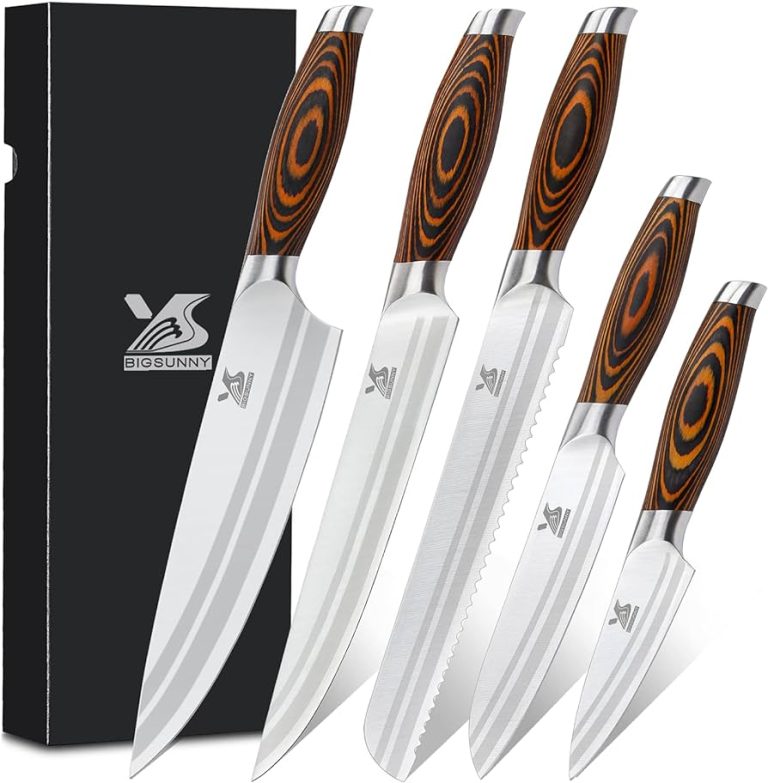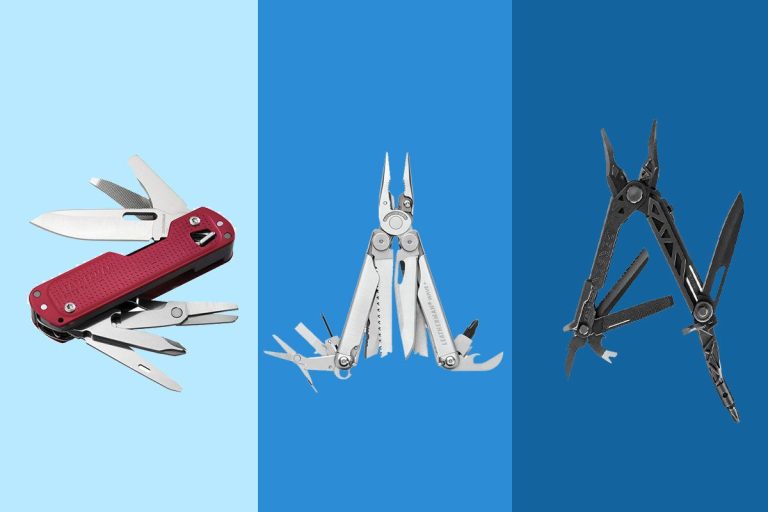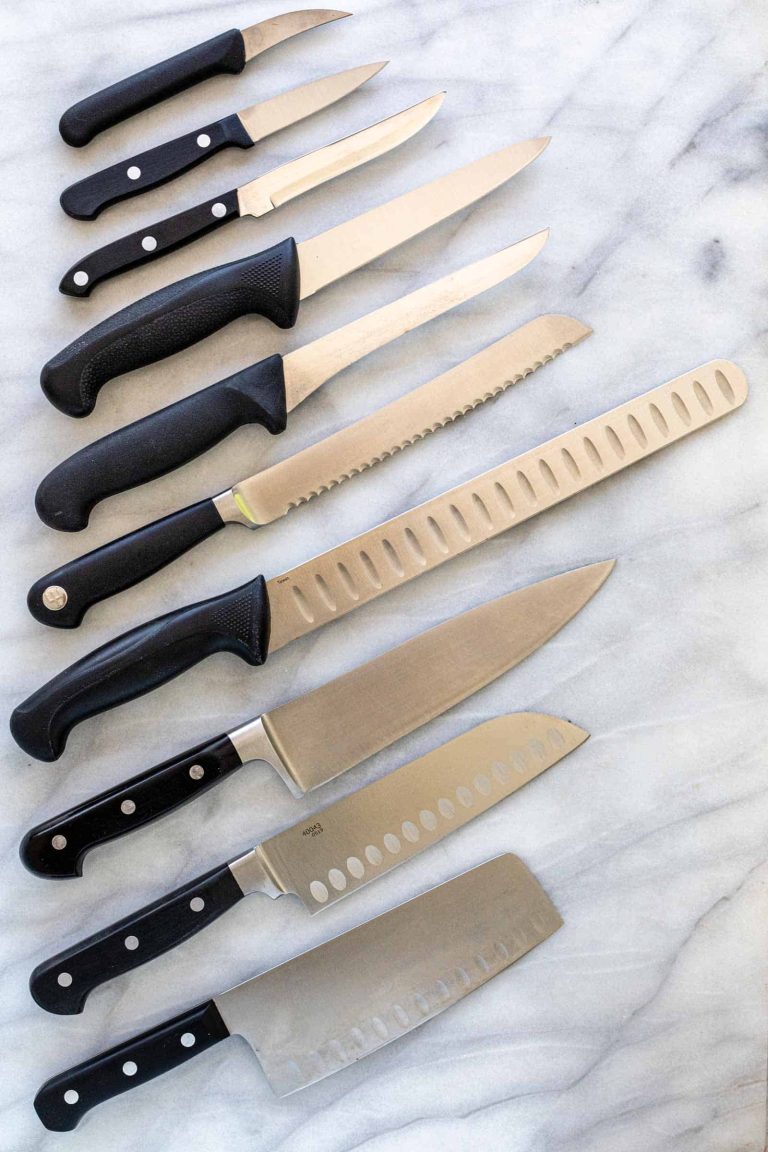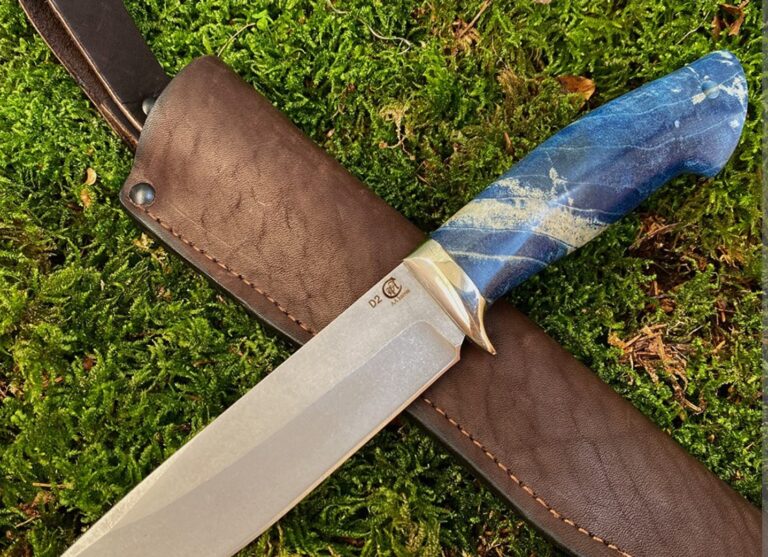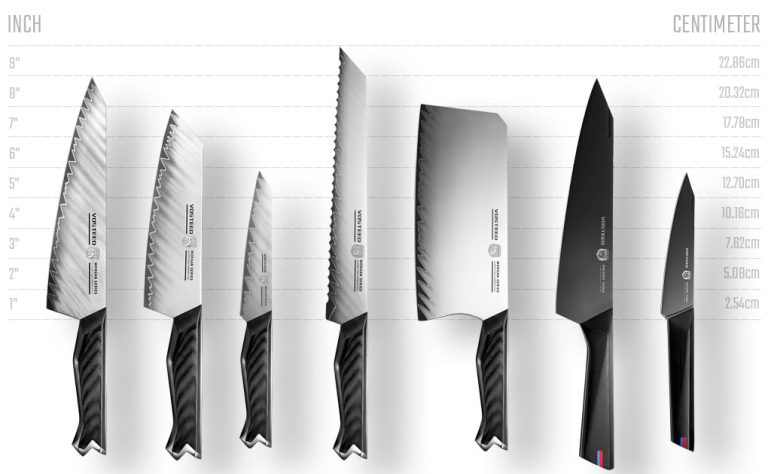Carbon Steel Knife Care: Ultimate Guide for Maintaining Razor-Sharp Blades
To care for a carbon steel knife, keep it dry after use and apply a protective coating of oil. Carbon steel knives require regular maintenance to prevent rust and maintain their sharpness.
Carbon steel knives are known for their durability and sharpness, making them a popular choice among chefs and cooking enthusiasts. However, they require special care to keep them in optimal condition. We will discuss the importance of proper carbon steel knife care and provide useful tips to help you maintain the longevity and performance of your knife.
By following these guidelines, you can ensure that your carbon steel knife remains sharp, rust-free, and ready for all your culinary adventures. Let’s dive into the world of carbon steel knife care and discover how to keep your knife in top shape.
Importance Of Knife Care
The importance of knife care cannot be overstated, especially when it comes to carbon steel knives. Proper care and maintenance are essential for ensuring their longevity, optimal performance, sharpness, and promoting safety and hygiene in the kitchen.
Carbon steel knives are known for their exceptional sharpness and edge retention. However, they are susceptible to rust and corrosion if not cared for properly. Regular cleaning and drying are crucial to prevent moisture buildup that can lead to rust formation. Additionally, **oiling the blade** periodically creates a protective barrier against corrosion.
Furthermore, **proper storage** is vital to avoid damage and maintain the knife’s sharpness. Storing carbon steel knives in a sheath or knife block helps protect the blade from accidental nicks and cuts. **Regular sharpening** is also necessary to maintain the knife’s cutting efficiency.
By prioritizing knife care, you not only ensure the longevity of your carbon steel knives but also enhance their performance, guaranteeing safety and hygiene in your kitchen. Remember, a well-cared-for knife is a chef’s best friend.
Essential Tools For Knife Care
Essential Tools for Knife Care:
- Honing rod: A honing rod is a crucial tool for knife maintenance. Use it to realign the blade’s edge, keeping it sharp and avoiding dullness.
- Whetstone: A good quality whetstone is essential for sharpening carbon steel knives. Proper sharpening with a whetstone helps maintain the knife’s cutting performance.
- Cleaning cloth: A soft, non-abrasive cleaning cloth is necessary to keep the knife free from debris, oil, and dirt. Regularly wipe down the blade after use to prevent corrosion.
- Knife oil: Applying a thin coat of knife oil helps protect the carbon steel from rust and acts as a barrier against moisture. This is particularly important for prolonged storage.
Cleaning And Maintenance
Cleaning and Maintenance
Proper cleaning techniques are essential for maintaining the longevity and performance of your carbon steel knives. When it comes to cleaning carbon steel knives, there are a few crucial do’s and don’ts to keep in mind.
- Do: Clean the knives immediately after use to prevent any food residue from sticking to the blade.
- Do: Use warm soapy water and a non-abrasive sponge or cloth to gently clean the knife.
- Don’t: Use abrasive cleaners or scouring pads, as they can scratch the blade surface.
- Do: Dry the knife thoroughly with a soft towel to prevent any moisture from causing rust.
- Do: Store the knife in a dry place to avoid exposure to humidity.
- Don’t: Store the knife in a damp environment, as it can promote corrosion.
By following these proper cleaning techniques, you can ensure that your carbon steel knife remains sharp, rust-free, and in optimal condition for years to come.
Sharpening Techniques
Carbon steel knives require proper care and maintenance to maintain their sharpness and longevity. When it comes to sharpening techniques, there are a few options to consider.
Using a whetstone is a common and effective method for sharpening carbon steel knives. It involves wetting the stone, placing the knife at a specific angle, and moving it back and forth to create a burr, which is then removed by flipping the knife and repeating the process.
Another option is honing the blades with a honing rod. This technique helps realign the knife’s edge, keeping it straight and sharp. Simply hold the knife at a slight angle and run it along the rod, applying light pressure.
If you are not confident in your sharpening skills, professional sharpening services are available. These experts have the knowledge and tools to ensure that your carbon steel knives are properly sharpened and maintained.
Preventing Rust And Corrosion
Carbon steel knives require special care to prevent rust and corrosion. **Proper maintenance** can extend the lifespan of these knives and ensure optimal performance. Here are some **helpful tips** to prevent rust formation on carbon steel blades:
- **Keep the knife clean and dry**: After each use, gently clean the blade with a mild soap and warm water. Make sure to thoroughly dry it to remove all moisture.
- **Apply a protective coating**: Consider applying a thin layer of food-safe oil or a rust inhibitor to protect the blade from moisture and oxidation.
- **Store the knife properly**: It is essential to store carbon steel knives in a dry place, away from humidity. Consider using a knife sheath or blade oil to provide an extra layer of protection.
- **Avoid prolonged exposure to moisture**: Carbon steel knives should not be left in damp environments or immersed in water for an extended period of time.
- **Regularly inspect for rust**: Routinely check your carbon steel knives for any signs of rust. If you notice any, use a gentle abrasive pad or fine steel wool to remove the rust.
Taking these precautions can help **preserve the beauty and functionality** of your carbon steel knives. By following these tips, you can ensure that your knives remain rust-free and ready for use when you need them.
Storage Options
Storage Options
When it comes to preserving the longevity of your carbon steel knives, selecting the ideal storage solution is crucial. Proper storage not only keeps your knives safe but also helps to maintain their sharpness and prevent damage or dullness.
Avoiding Damage and Dullness During Storage
To avoid damage and dullness, it’s important to consider a few key factors for knife storage:
- Always clean and dry your knives before storing them to prevent corrosion.
- Store knives in a knife block or magnetic strip to avoid contact with other utensils or surfaces that may cause scratches.
- Consider using blade guards or sheaths to protect the knife’s edge and prevent accidental cuts.
- Avoid storing carbon steel knives in humid environments, as moisture can lead to rust and corrosion.
Portable Storage for Chefs on the Go
For chefs on the go, portable storage is essential. Invest in a quality knife roll or case that provides secure compartments for each knife, keeping them organized and protected during transportation. Look for options with sturdy handles and locking mechanisms to ensure the safety of your knives while traveling.
Handling And Knife Usage
Handling and using a carbon steel knife requires proper techniques to ensure longevity and optimal performance. When handling your knife, it is essential to practice correct techniques to avoid any unnecessary damage or accidents. For example, always hold the knife firmly but not too tightly to maintain control during use. Additionally, avoid improper cutting surfaces, such as hard countertops or glass, as they can dull the blade or even chip it. Remember to use a cutting board made of softer materials like wood or plastic to protect the knife’s edge. Understanding the limitations of your knife is crucial as well. Carbon steel knives are great for precise slicing and dicing tasks, but they may not be suitable for heavy-duty jobs like bone cutting. By adhering to these guidelines, you can ensure proper handling and make the most out of your carbon steel knife.
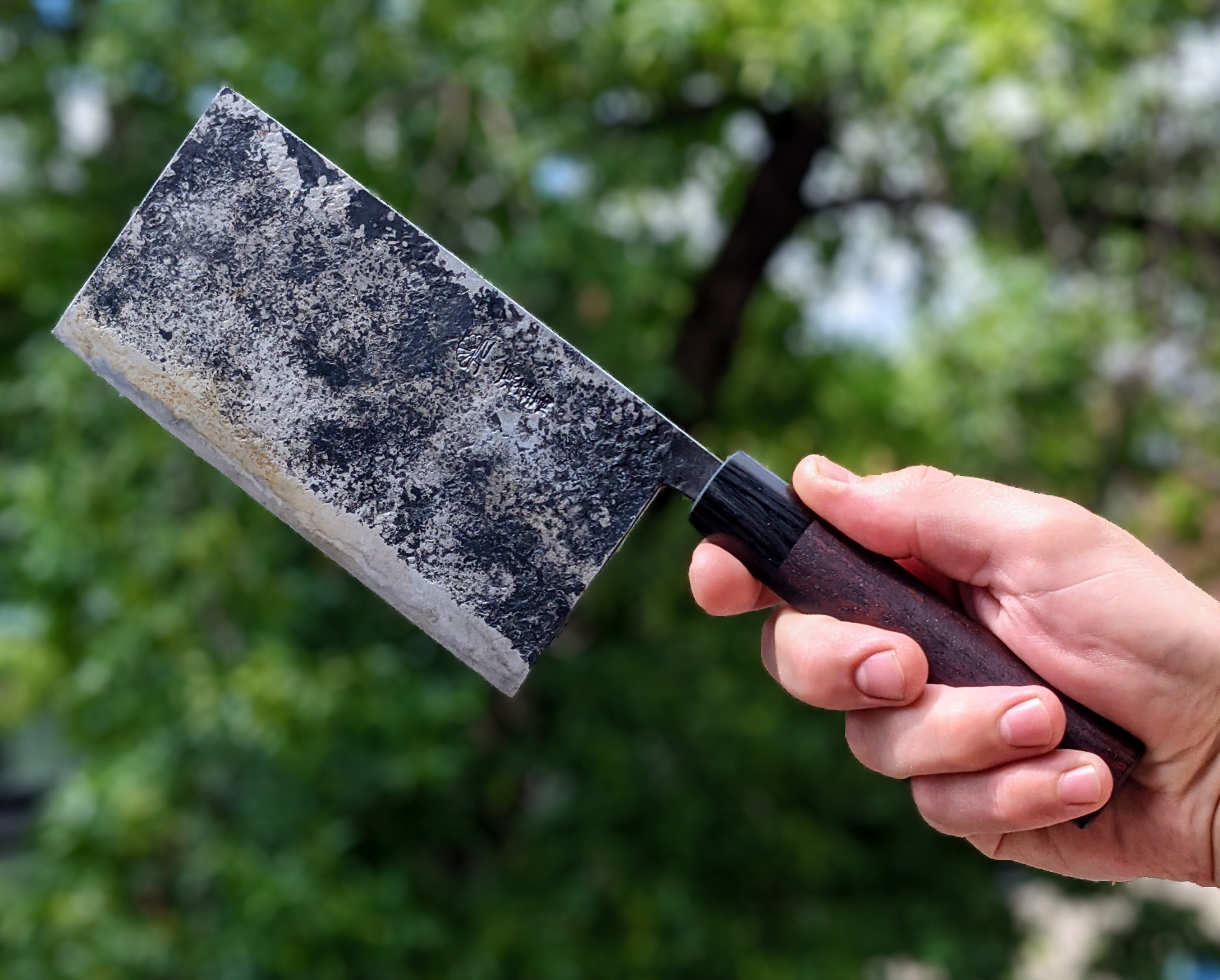
Credit: knifewear.com
Regular Knife Care Routine
Establishing a maintenance schedule is crucial for ensuring the longevity and performance of your carbon steel knives. By incorporating a regular cleaning, sharpening, and maintenance routine, you can enhance their longevity and preserve their cutting edge.
For cleaning, **wash your knives by hand** with warm water and mild soap immediately after each use, ensuring that you dry them thoroughly to prevent rust. **Avoid using abrasive pads or harsh cleansers** that can damage the blade.
Sharpening your knives regularly is vital to maintaining their sharpness. **Invest in a quality sharpening stone or honing rod** and follow the proper technique to restore the blade’s edge. **Be mindful of the angle** at which you sharpen for optimal results.
In addition to cleaning and sharpening, regular maintenance plays a significant role in carbon steel knife care. **Apply a thin layer of food-grade mineral oil** or blade oil after cleaning and drying to prevent oxidation. This oil **helps protect against rust** and keeps the blade in top condition.
By establishing a consistent care routine, you can enjoy the long-term benefits of **having sharp, rust-free** carbon steel knives that will serve you well in your culinary endeavors.
Troubleshooting Common Knife Issues
Blade dullness is a common problem that can be easily addressed. Regular sharpening using a sharpening stone or honing rod will help maintain a sharp edge. **Applying adequate pressure** and **maintaining the correct angle** while sharpening is crucial for optimal results. If your knife has **chipped or damaged edges**, have it professionally repaired or use a sharpening system specifically designed for removing chips.
Handle and grip problems can impact the overall performance of a knife. **Loose or damaged handles** can be fixed by **tightening the screws** or **replacing the handle** if necessary. Consider **adding grip-enhancing materials** such as skateboard tape or *replacing the handle with one that offers better ergonomics*. This will provide improved control and reduce the risk of accidents.
Expert Tips For Longevity
Proper maintenance and care are essential for ensuring the longevity of your carbon steel knives. To keep your blades razor-sharp, follow these expert tips:
- Regularly clean your knives after each use, using mild soap and warm water. Avoid using abrasive cleaners or scrubbers that can damage the steel.
- Dry your knives thoroughly to prevent moisture and avoid leaving them wet or damp for extended periods.
- Apply a thin layer of food-safe mineral oil on the blade to prevent rust and corrosion.
- Store your knives in a knife block, sheath, or on a magnetic strip to protect the blade from nicks and cuts.
- Avoid using glass, ceramic, or granite cutting boards as they can dull the blade quicker. Instead, opt for wooden or plastic cutting boards.
- Regularly sharpen your knives using a high-quality sharpening stone or honing rod to maintain their sharpness.
In addition to these tips, it’s important to avoid common mistakes made by knife owners:
- Don’t leave your knives soaking in water or other liquid for extended periods as it can cause damage.
- Avoid using your knives for tasks they aren’t designed for, such as prying open cans or splitting bones.
- Never put your knives in the dishwasher, as the high heat and harsh detergents can cause the blade to dull and damage the handle.
By following these expert guidelines, you can prolong the lifespan of your carbon steel knives and ensure they remain sharp and reliable for years to come.
Conclusion
Proper care and maintenance of your carbon steel knife is essential to prolong its longevity and optimize its performance. By following a few simple steps, you can ensure that your knife remains in top condition for years to come. Start by cleaning and drying the knife after each use to prevent rust or corrosion from forming.
Applying a thin layer of oil to the blade will further protect it from moisture and enhance its durability. Remember to store your knife in a dry and moisture-free environment to prevent any damage. Regular sharpening will maintain the knife’s sharpness and precision.
Lastly, handle your carbon steel knife with care, avoiding excessive force or improper usage that could lead to chipping or breaking. By implementing these practices, you can enjoy the full potential of your carbon steel knife and make it a versatile tool in your kitchen arsenal.

